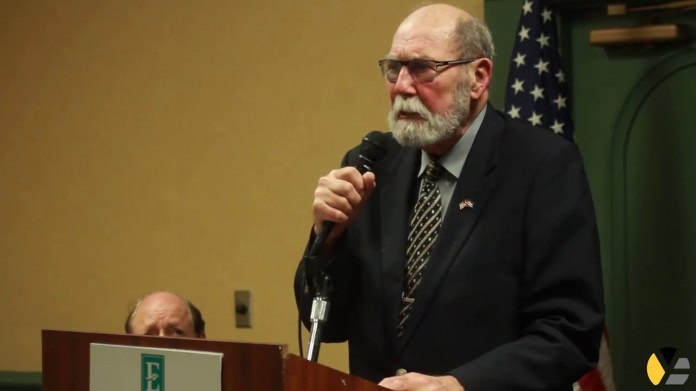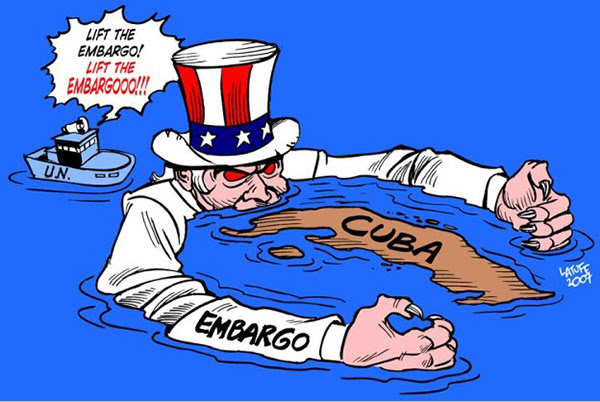The 60-Year U.S. Blockade on Cuba Is an Abomination just as Guantanamo—with No End in Sight
LATIN AMERICA AND THE CARIBBEAN, 2 Jan 2023
David Starr | CovertAction Magazine – TRANSCEND Media Service
14 Dec 2022 – “El Bloqueo” (The Blockade) is what Cubans call it. It is a 60-year-old abomination. It is the U.S. embargo against Cuba.
Imposed by U.S. President John F. Kennedy in 1962, the embargo has and continues to be an utter failure in its objective, that is, trying to fuel a counter-revolution within the island nation; or more politely put, “regime change.”
Contrary to U.S. media and government propaganda, the 1959 Cuban Revolution has transformed Cuba from its status as an American neo-colony before 1959 and improved Cubans quality of life by nationalizing its economy and investing in healthcare and education.

Stansfield Smith, an anti-war activist, wrote that The New York Times, however, “still asserted Cuba is a mismanaged anachronism, that the average Cuban has no say-so, that the government does not permit public dialogue on its policies. This is arrogant nonsense to anyone knowledgeable about Cuba.” Smith continued: “Unlike the U.S., Cuba has a number of mass organizations that involve the people in running the government,” such as, “the Confederation of Cuban Workers (CTC), the National Association of Small Farmers (FEU) and Federation of Pre-University Students (FEEM).” Smith then dares to write, “Clearly this system is vastly more open and democratic than in the U.S.” He may have a point since U.S. society has become more alienating and violent. Plus, there is an electoral system that is essentially controlled by big corporations through massive donations to their political pawns. But, of course, there are shades of gray.
But that is not all Smith wrote about: “In 2011 Cuba had a national discussion in thousands of assemblies in workplaces and schools around the country to establish new laws and guidelines for economic reforms. The U.S. did no such thing when confronted by the 2008 economic crisis.” Further, “In 2018 Cuba had a similar national discussion on a new constitution. The process was discussed in over 100,000 workplaces and community meetings. After the debates and modifications of the draft, the National Assembly approved it, which was voted on in a national referendum.”

The historical accomplishments in improving health care and education in Cuba are vastly overlooked by the U.S. media and government. Or they are put in a negative light.
Now, with the embargo still in place, health care and education are being affected. There have been shortages of some items like syringes used to apply vaccines to the effects caused by the COVID-19 virus. COVID-19 has only added to the hardships Cubans face. While Cuban doctors succeeded in developing vaccines, shortages prevent the entire Cuban population from being vaccinated [Note: 89% of Cubans though have been vaccinated].
And there have been power outages where millions of Cubans have periodically gone without electrical power.
U.S. leaders and their supporters have claimed that Cuba is a terrorist threat, putting it on the State Sponsor of Terrorism List (SSOT). This would be laughable if the situation in the island nation were not so serious. Is Cuba a threat? Yes, the threat of a good example for other developing countries to more or less follow. But the U.S. cannot stand that scenario.
American University Professor William LeoGrande is among those to note that the embargo has been a failure: “For 60 years, the economic embargo has failed to achieve any of its stated policy goals while exacting a high human cost, stifling the development of the Cuban economy and making daily life harder for Cuban families.”

Before JFK’s imposition of the embargo, President Dwight Eisenhower set up sanctions on the island nation after its revolution in 1959. This resulted in U.S. exports being cut off except for food and medicine. JFK added to this by instituting the embargo, which banned all trade and financial transactions with Cuba unless approved by the Treasury Department.

President Lyndon Johnson tightened the embargo further with more restrictions that made it difficult for Cuba to even establish trade relations with other countries. Years later (1992), President George H.W. Bush signed the misnamed Cuban Democracy Act which went in the opposite direction of its name by forbidding Cuba from doing business with U.S. companies that were in other nations.


Taking cruel advantage of Cuba’s loss of trade with the former socialist countries in the 1990s, the embargo was again tightened by the 1996 Helms-Burton Act. Signed by Bill Clinton, this act forced the president to seek congressional approval to lift sanctions, which was not going to happen.
In the 2000s, some progress was being made after President Barack Obama lifted restrictions limiting Cuban-Americans from visiting their families in Cuba and allowing them to bring in remittances. The U.S. Embassy was brought back, Cuba was removed from the SSOT list and there was expanded access to the internet. Then came Trump, under whom U.S. policy regressed, taking away the policies that Obama had established. It was back to rigid, Cold War thinking.

When Joe Biden took over as U.S. president, there was a leaning toward a thaw in U.S.-Cuba relations. The U.S. Embassy was restaffed, along with the intent to facilitate family reunification, expand authorized travel, support greater access to internet services, and enable increased remittance flows to the Cuban people. (U.S. Commerce Department, May 16, 2022) However, it is one thing to talk the talk, and another to walk the walk. Ultimately Biden has been more concerned about Florida politics than the Cuban people.

It goes without saying that the embargo is not only a failure but senseless as well. U.S. leaders/officials have no justification to continue the embargo. Cuba is targeted because it committed the ultimate sin of practicing some degree of socialism in the face of capitalist rule.
There are no excuses for the U.S. establishment other than flaunting a superiority complex where the U.S. has all the answers for the world’s problems (although the U.S., as an empire, bears the blame for many of these problems). The embargo also symbolizes the big ego the establishment has. Lifting the embargo would be a sign of weakness.
All of Cuba’s problems come primarily from the U.S. exporting “freedom” and “democracy,” which is not really a sincere objective given the U.S.’s ideological interests. The priority is to maintain market satellites worldwide to satisfy the voracious hunger for profits. Freedom and democracy are words that have generally turned into cliches where U.S. foreign policy is concerned.
Cuban opposition to the embargo has been clear, showing unity among the Cuban people. For example, Cuban Minister of Foreign Affairs Bruno Rodríguez did not mince words when he criticized the U.S. for maintaining the embargo, calling it “a policy of abuse against Cuba and its people, which is rejected by almost all members of the international community.”

Victor Gaute, deputy president of the NGO, the Cuban Institute of Friendship with the Peoples (ICAP), also did not mince words: “We firmly oppose the criminal U.S. blockade against Cuba, which is designed to suffocate the Cuban people.” And Olga Machado, a small business owner in central Havana, emphasized, “The U.S. blockade is inhumane.”
The world community overwhelmingly has condemned the embargo. There have been votes in the UN General Assembly for 29 years where the support for lifting the embargo was one-sided, with only two or three nations voting to maintain it. For example, the 2019 vote was 187-3 with the U.S., Israel (not surprising) and Brazil voting no. COVID-19 postponed the vote but in 2022 the vote again was one-sided: 184-2, only the U.S. and Israel voting no.
U.S. officials have had hypocritical, contradictory and outrageous reasons for maintaining the embargo. The rhetoric, for example, of Rodney Hunter, the U.S. Mission’s political coordinator, was perverse: “Sanctions are a way to achieve foreign policy, national security, and other national and international objectives and are a set of tools in our broader effort toward Cuba to advance democracy, promote respect for human rights, help the Cuban people exercise the fundamental freedoms enshrined in the Universal Declaration of Human Rights.”

This is bullshit. Historically and now, the U.S., as an empire, has shown what it means to respect the rights and sovereignty of nations like Cuba. An Orwellian-like showing.
With Cuba came the demonization of revolutionaries who fought to establish the Revolution in 1959. Leaders like Fidel Castro and Che Guevara who took one hell of a chance going up against the U.S.-backed tyrant Fulgencio Batista and his army. Major credit should be given to most of the Cuban people for aiding the revolutionaries.

Without them, it would have not been possible to have and win a revolution. But at the same time, it should be said that Cuba is not exempt from criticism. Its system is not perfect, not a “workers’ paradise.” But compared to other “Third World” nations, Cuba has had a better system, especially if the embargo were eliminated.
The powers-that-be in Washington, in particular the Republicans, are still taking a hard-line stance. They reflexively and publicly hold tight to the idea that the embargo promotes democracy. Given the U.S. role in Cuba before 1959, where it had private monopolies over a number of economic sectors, and could militarily intervene at will, this claim does not seem reassuring.
The Nation magazine published a piece (January 26, 2022) by Peter Kornbluh which notes that the publication has taken a strong stance against the embargo over the years: “During the past six decades, The Nation has consistently opposed the U.S. embargo against Cuba with titles like ‘Endless Embargo,’ ‘Tightening the Chokehold on Cuba,’ ‘An Embargo That Serves No Purpose,’ and ‘The Stupid Embargo.”’
Kornbluh’s article quotes several sources reflecting the absurdity of U.S. hostility toward Cuba. For example:
From the vantage point of common sense, economics and diplomacy, we should be moving to normalize our relations with Cuba—not because we are looking for a love affair but because it is the only reasonable course for two neighboring nations…
–“Common Sense and Cuba,” by Senator George McGovern, February 6, 1976

Under the fashionable label of “promoting democracy,” [then] Representative Robert Torricelli [a Democrat] is propelling a new “punish Cuba” bill through Congress….Torricelli’s missionary passion is directed toward tightening the already strict embargo on Cuba, so as to, in his words, “shortening the suffering of the Cuban people by isolating Castro and forcing him out.”
–“Tightening the Chokehold on Cuba,” by Saul Landau, June 15, 1992

The administration frequently says that it wishes to see a peaceful transitional process in Cuba. And yet, if the objective is to get rid of Castro, then one cannot expect the process to be peaceful, for the hard fact that Castro will not simply resign or fade away because the United States wants him to; rather if need be, he would fight, and many Cubans would fight with him.
–“Washington’s Costly Cuban Policy,” by Wayne S. Smith, July 3, 2000

There are quite a number of Cubans who have emigrated to the U.S. But is it solely because of political repression? The U.S. media and U.S. government say this is the key reason. But that would be wrong. The main reason is economic. With the embargo causing shortages and hardship (and with whatever internal flaws), Cubans are like anyone else who decide to migrate to the U.S., and the Western world: Conditions are more stable and there is a chance to live a reasonably comfortable life. (Although this does not always happen.)
Stansfield Smith puts it this way: “The media historically describes Cubans as emigrating due to the revolutionary government’s economic incompetence and political repression. In fact, people all over the world emigrate from poorer countries to richer ones.”
A standard tactic used in U.S. propaganda is to demonize Cuba and to omit any discussion of the political context that has fueled some of the social problems gripping the island. The omission is with regards to the embargo. It is ignored so blatantly that U.S. citizens are not aware of its consequences. The media invite ideologues posing as Cuba “experts” to say that it is hopeless in Cuba with the system that has been practiced there. The silence is deafening when the embargo is left out of the conversation.
Despite the refusal of U.S. leaders, there has to be a concerted effort to try to end the embargo. The U.S.’s reputation has been tarnished worldwide by letting it continue. And Cuba continues to suffer the consequences. It should not be this way.
___________________________________________
 David Starr got interested in politics in 1986 when he lived in Hawai’i. He joined such groups as the Latin American and Caribbean Solidarity Association (LACASA), the Hawai’i Union of Socialists (HUS) and Ka Lehui Hawai’i (The Hawaiian Nation). He also created a publication entitled Voices of Change, and had articles published in the Honolulu Weekly and Toward Freedom during the 1990s. He can be reached at dl_starr@hotmail.com
David Starr got interested in politics in 1986 when he lived in Hawai’i. He joined such groups as the Latin American and Caribbean Solidarity Association (LACASA), the Hawai’i Union of Socialists (HUS) and Ka Lehui Hawai’i (The Hawaiian Nation). He also created a publication entitled Voices of Change, and had articles published in the Honolulu Weekly and Toward Freedom during the 1990s. He can be reached at dl_starr@hotmail.com
Go to Original – covertactionmagazine.com
Tags: Anglo America, Blockade, Cuba, Latin America Caribbean, South America, USA
DISCLAIMER: The statements, views and opinions expressed in pieces republished here are solely those of the authors and do not necessarily represent those of TMS. In accordance with title 17 U.S.C. section 107, this material is distributed without profit to those who have expressed a prior interest in receiving the included information for research and educational purposes. TMS has no affiliation whatsoever with the originator of this article nor is TMS endorsed or sponsored by the originator. “GO TO ORIGINAL” links are provided as a convenience to our readers and allow for verification of authenticity. However, as originating pages are often updated by their originating host sites, the versions posted may not match the versions our readers view when clicking the “GO TO ORIGINAL” links. This site contains copyrighted material the use of which has not always been specifically authorized by the copyright owner. We are making such material available in our efforts to advance understanding of environmental, political, human rights, economic, democracy, scientific, and social justice issues, etc. We believe this constitutes a ‘fair use’ of any such copyrighted material as provided for in section 107 of the US Copyright Law. In accordance with Title 17 U.S.C. Section 107, the material on this site is distributed without profit to those who have expressed a prior interest in receiving the included information for research and educational purposes. For more information go to: http://www.law.cornell.edu/uscode/17/107.shtml. If you wish to use copyrighted material from this site for purposes of your own that go beyond ‘fair use’, you must obtain permission from the copyright owner.
Read more
Click here to go to the current weekly digest or pick another article:
LATIN AMERICA AND THE CARIBBEAN:
